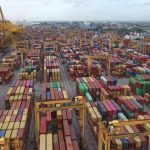Freight rates for Russian ESPO Blend oil loading from the Far Eastern port of Kozmino have jumped fivefold amid a lack of vessels after fresh U.S. sanctions cut availability of tankers, three traders said and data showed.
Higher freight costs cut Russian oil sellers’ revenues that are already under pressure from U.S. sanctions and complicated logistics, while a lack of vessels in the region during the winter season may lead to loading disruptions, traders said.
On Jan. 10 the U.S. imposed the toughest sanctions yet on the Russian oil industry, targeting major oil companies, Surgutneftegaz and Gazprom Neft, as well as more than 180 vessels.
The cost of oil shipping from Kozmino port to China on Aframax tankers, which can carry some 100,000 metric tons, has jumped to $6.5 million-7.5 million from $1.5 million on average at the end of the last year, traders said.
Freight rates for oil shipments from Kozmino to northern China’s ports were at $6.5 million, and for southern ports at 7.5 million, according to Simpson Space Young data available via LSEG Workspace.
Freight rates for ESPO Blend oil shipments to India also jumped to some $9-10 million per one-way trip compared to below $3 million at the end of 2024, traders said.
One of the traders said the U.S. sanctions targeted more than 80 tankers involved in Russian oil shipments to Asia, with many of those used for ESPO Blend oil shipments.
“Freight is so expensive, but even so it doesn’t solve the issue: there are not enough vessels,” the trader said.
Another trader said that even though there is lack of tankers, oil loadings from Kozmino have been going smoothly in recent weeks.
Oil exports from the eastern port were disrupted during the first ten days of January due to a hard storm that kept the terminal closed for some days.
Traders also said sellers can secure ESPO Blend oil supplies by using ship-to-ship (STS) points, for instance near South Korea’s Yosu or Chinese ports.
The STS point near Yosu was regularly used during the suspension of Sokol oil sales a year ago, when Russian companies were stuck with a number of oil cargoes unsold on the water.
Source: Reuters (Reporting by Reuters; Editing by Jan Harvey)




